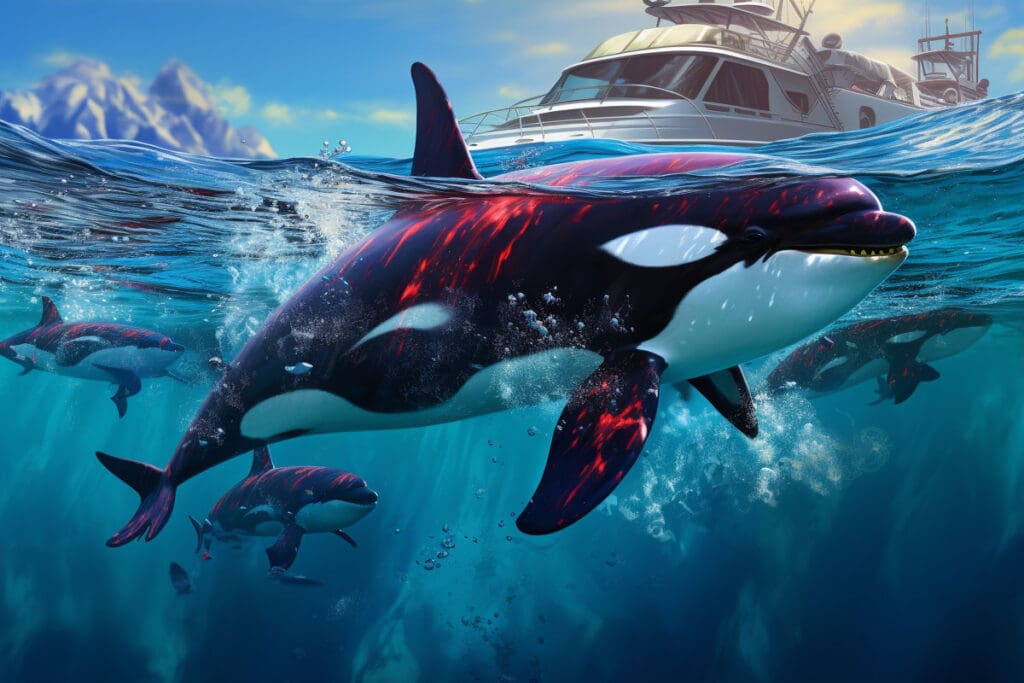After killer whales sank yet a fourth vessel in the Strait of Gibraltar last week, Scientists now believe the mammals are spreading the behavior among the rest of the orca through social learning. Find out why.

Killer Whales Have Sunk Four Boats in the Strait of Gibraltar
In the past two years, four oceangoing vessels were sunk off the Iberian coast of Europe.
The most recent incident happened last week off the coast of Morocco in the Strait of Gibraltar. It occurred on the afternoon of October 31, when killer whales repeatedly rammed into the Grazie Mamma, a vessel owned by the Polish cruise company Morskie Mile, Smithsonian reported.
According to a post by the company on Facebook, the orcas struck the yacht repeatedly for forty-five minutes. The damage caused the boat to fill with water. The Moroccan Navy, search and rescue personnel, and tugboats worked together in an attempt to bring the damaged vessel safely into port at Tanger-Med. However, despite their efforts, the yacht sank near the port’s entrance. Luckily, the crew and captain were reported to be “safe, unharmed, and sound.”
Read More: How Seaweed Could Save the World
Two Previous Attacks in May
Five months previously, on May 4, 2023, another yacht was attacked by killer whales off the coast of Spain in the Strait of Gibraltar.
According to the reports, three orcas struck a German yacht during the night, according to its skipper Werner Schaufelberger, Live Science reported.
“There were two smaller and one larger one,” Schaufelberger said. “The little ones shook the rudder at the back while the big one repeatedly backed up and rammed the ship with full force from the side.”
“The two little orcas observed the bigger one’s technique and, with a slight run-up, they too slammed into the boat,” according to Schaufelberger, who described it as the smaller killer whales imitating the larger one.
The Spanish Coast Guard rescued the skipper and crew and towed the boat back to Barbate. However, the yacht sank at the port entrance.
On May 2, 2023, as a sailboat was navigating the Strait of Gibraltar, it was assailed by a pod of six orcas.
One of the boat’s passengers described it as a mother orca appearing to teach her calves how to charge into the rudder.
“It was definitely some form of education, teaching going on,” Blackburn told 9news.
Why are Killer Whales Assaulting Boats?
According to reports, the encounters with aggressive killer whales off the Iberian coast began three years earlier in May 2020. Since then, the attacks on boats in the region are becoming more frequent.
A study on the matter was published in June 2022 in the journal Marine Mammal Science.
“The reports of interactions have been continuous since 2020 in places where orcas are found, either in Galicia or in the Strait,” said Alfredo López Fernandez, co-author of the study, and a biologist at the University of Aveiro in Portugal. Fernandez is also a representative of the Grupo de Trabajo Orca Atlántica (Atlantic Orca Working Group).
Read More: Scientists Discover Greenland Sharks Can Live to 400
Scientists Believe Assaults Sparked by Defensive Behavior
Fernandez and researchers believe that a traumatic event may have triggered a single orca. Researchers say a “critical moment of agony” may have caused an orca to change its behavior defensively. This may have been a collision with the boat or becoming entrapped during illegal fishing.
The speculation is this traumatized orca began to view boats as a threat and began to attack them. The scientists hypothesize that the rest of the killer whale population learned to imitate this behavior.
From what researchers know, in the majority of these reported boat attacks, the killer whales purposely aimed for a boat’s rudder. They then either bit, bent, or broke it.
Orcas Can Learn by Observation and Imitation
According to a 2022 study, orcas, being social creatures, can easily learn and reproduce behaviors performed by others.
“The orcas are doing this on purpose, of course, “Fernandez said. “We don’t know the origin or the motivation, but defensive behavior based on trauma, as the origin of all this, gains more strength for us every day.” López Fernandez said.
“We do not interpret that the orcas are teaching the young,” Fernandez said. “Although, the behavior has spread to the young vertically, simply by imitation. And later horizontally among them, because they consider it something important in their lives.”
Read More: 8 Underwater Sites Even More Dangerous to Visit Than the Titanic
Killer Whale Uprising?
Scientists reported last May, that since 2020, they have recorded more than 500 interactions between killer whales and ships off the Iberian Peninsula.
Although it’s no laughing matter and a dangerous situation, the killer whales have become stars on social media. There are memes and merchandise that suggest these black-and-white members of the dolphin family are coordinating an “orca uprising.”









